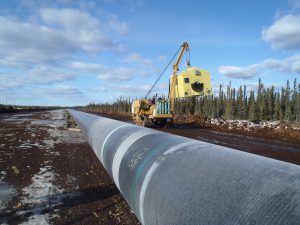On August 8, the U.S. Court of Appeals for the Third Circuit released an opinion rejecting several challenges to  environmental permits and authorizations granted by environmental regulatory agencies in New Jersey and Pennsylvania. The consolidated cases are Delaware Riverkeeper Network, et al., v. Secretary Pennsylvania Department of Environmental Protection and New Jersey Conservation Foundation, et al, v. New Jersey Department of Environment of Environmental Protection, et al. At the outset, however, the Court of Appeals considered, and rejected, the arguments the states made that the Court of Appeals was without jurisdiction to review these petitions, particularly concerning those state actions assessing the water quality impacts of this pipeline expansion under Section 401 of the Clean Water Act (CWA).
environmental permits and authorizations granted by environmental regulatory agencies in New Jersey and Pennsylvania. The consolidated cases are Delaware Riverkeeper Network, et al., v. Secretary Pennsylvania Department of Environmental Protection and New Jersey Conservation Foundation, et al, v. New Jersey Department of Environment of Environmental Protection, et al. At the outset, however, the Court of Appeals considered, and rejected, the arguments the states made that the Court of Appeals was without jurisdiction to review these petitions, particularly concerning those state actions assessing the water quality impacts of this pipeline expansion under Section 401 of the Clean Water Act (CWA).
Transcontinental Gas Pipe Line Company, LLC (Transco) operates a natural gas pipeline extending from South Texas to New York. Transco proposed a local expansion of this pipeline, which required, in addition to the approval of the Federal Energy Regulatory Commission (FERC), the issuance of facilitating state environmental permits and authorizations in New Jersey and Pennsylvania. FERC has the exclusive authority to authorize the construction and operation of interstate natural gas pipelines. However, before FERC can grant a certificate of public convenience or necessity, it must examine the potential environmental consequences of the actions it takes in accordance with the provisions of the National Environmental Policy Act (NEPA). The affected states, here New Jersey and Pennsylvania, participate in the calculus of environmental compliance of this pipeline project through the exercise of their reviewing authority as provided to them under the federal Clean Air Act, the CWA, and the Coastal Zone Management Act.
Both New Jersey and Pennsylvania were obliged to determine the water quality impacts, if any on their states, and issue appropriate permits under state environmental statutes. According to the Court of Appeals, the New Jersey and Pennsylvania agencies reviewed Transco’s proposal for potential water quality impacts and issued permits for construction. The New Jersey authorizations were completed in April 2015, and the Pennsylvania actions were completed in July 2015, and this lawsuit was filed soon thereafter. These permitting actions were challenged by several local environmental organizations in the Third Circuit.
Before the Court of Appeals could review the merits of the challenges, it was obliged to consider the arguments the states made that the Court of Appeals was without jurisdiction to review these petitions, particularly concerning those state actions assessing the water quality impacts of this pipeline expansion under Section 401 of the CWA. The Court of Appeals responded to these arguments by ruling that it had this authority through the Natural Gas Act (NGA); that these states were, in fact and law, acting pursuant to federal law in issuing state permits to Transco. To rule otherwise would be to frustrate the purpose of the Congress’ grant of jurisdiction to the federal courts under the NGA. The states also argued that their “mere participation” in this permitting scheme did not waive their sovereign immunity, but the Court of Appeals held that their voluntary participation in the regulatory schemes of the NCA and CWA constituted a waiver of their sovereign immunity, “given the clear language in these statutes subjecting their actions to federal review.” Moreover, under Third Circuit precedent, the states’ participation in these schemes is a knowing “gratuity waiver” — a state may consent to suit in federal court by accepting a gift or gratuity from Congress where a waiver of sovereign immunity may be a condition of acceptance. In addition, a grant of regulatory authority, such as that resulting though the operation of the NGA or CWA may be considered a gift or gratuity.
Satisfied that it had jurisdiction to decide these cases, the Court of Appeals made short work of the objections posed to the New Jersey and Pennsylvania permits, and concluded that neither state agency acted arbitrarily or capriciously in issuing these permits or other forms of authorization.
Photo: Jasonwoodhead23, Pipeline, Taken June 6, 2012 – Creative Commons
 Gravel2Gavel Construction & Real Estate Law Blog
Gravel2Gavel Construction & Real Estate Law Blog


